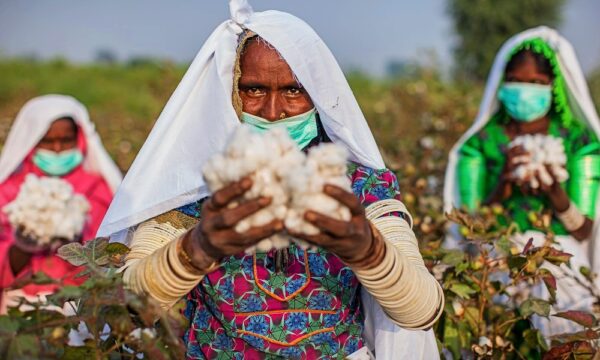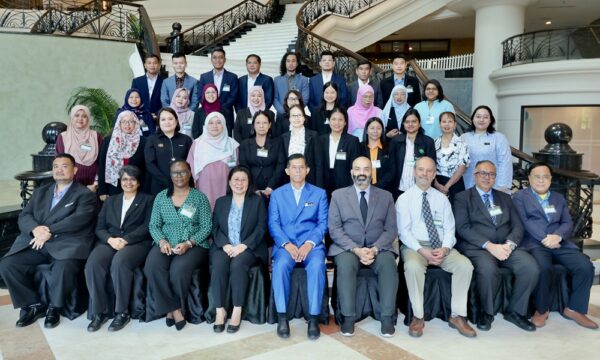
CABI has convened a plant biosecurity training and skills development workshop bringing together key players in Africa’s plant health ecosystem keen to help the continent’s smallholder farmers improve their livelihoods and food security.
The workshop was held, with support from the Australian Centre for International Agricultural research (ACIAR), as part of a scoping study on plant biosecurity training and skills development in Africa to assess the availability, quality, and effectiveness of current training programmes across the continent.
A desk review was carried out for over 50 institutions offering training related to plant biosecurity in 10 target countries. These are Burundi, Kenya, Uganda, Tanzania, Ethiopia, Rwanda, Mozambique, Malawi, South Africa, Zambia, as well as countries outside Africa.
Co-develop a roadmap for capacity strengthening in Africa
The workshop, held in Nairobi, Kenya, then sought to refine the scoping results, prioritize training needs, and co-develop a roadmap for capacity strengthening in Africa. Participants were drawn from universities and National Plant Protection Organizations (NPPOs) from 11 countries.
These included Burundi, Ethiopia, Kenya, Malawi, Mozambique, Rwanda, South Africa, Tanzania, Uganda, Zambia and Zimbabwe.
Other workshop participants included representatives from CABI, Kenya Institute of Curriculum Development (KICD) and Kenya Agricultural and Livestock Research Organization (KALRO), Australia-Africa Plant Biosecurity Partnership (AAPBP), COPE, Kenya Plant Health Inspectorate Service (KEPHIS), Murdoch and Curtin Universities from Australia, the Inter-African Phytosanitary Council of the African Union (AU-IAPSC), COLEAD, the International Plant Protection Convention (IPPC) as well as those from the private sector.
The CABI staff that participated in the workshop were Dr MaryLucy Oronje, Dr Joseph Mulema, Andela Kangwa, Stacey Odunga, Linda Likoko and Dr Roger Day. Opening remarks were given by Dr Morris Akiri, CABI’s Senior Regional Director, Africa.
Dr Akiri said, “Africa’s agricultural systems are facing mounting threats, from transboundary pests to invasive species, exacerbated by climate change, expanding trade routes, and resource constraints.
“The economic toll is sobering, with losses in the agricultural sector estimated at over USD $65 billion annually. These challenges demand coordinated responses rooted in strong institutions, skilled personnel, and responsive training systems.”
Critical aspect of agriculture, forestry, and environmental management

Dr Oronje, Senior Scientist, SPS, said, “Plant biosecurity is a critical aspect of agriculture, forestry, and environmental management, especially in regions where food security and biodiversity are at risk.
“It plays a vital role in safeguarding the agricultural, environmental, and economic interests of nations worldwide. With diverse climates, ecosystems, and agricultural practices across the continent, Africa faces unique challenges in protecting its plant resources from pests, diseases, and invasive species.”
She added that key components of plant biosecurity include prevention, surveillance, response, research and innovation.
Furthermore, the plant biosecurity curricula is multidisciplinary and blend plant science, entomology, pathology, regulatory policy, risk analysis, and agricultural management.
The course may include program level (undergraduate, postgraduate, certificate) with a comprehensive focus on quarantine and biosecurity regulations, pest risk analysis, entomology, plant biology surveillance and diagnostics, pest modelling, contingency plans including emergency response and risk communication.
Africa plant biosecurity programme that is holistic and multidisciplinary
Dr Mulema, Senior Scientist, Research, said, “The review workshop was highly engaging with discussions on the status of plant biosecurity, capacity building and skills development in the participating countries.
“Recommendations, such as harmonizing biosecurity courses to suit different industries, were made towards developing an Africa plant biosecurity programme that is holistic and multidisciplinary, built on well-trained and adequately equipped stakeholders.”
Biosecurity and Sanitary and Phytosanitary (SPS) systems in Africa are involved in responding to emerging pest threats, climate change, trade demands push for continental harmonization and regional integration.
The World Trade Organization (WTO) SPS Agreement, the African Continental Free Trade Area (AfCFTA) framework, and the regional economic bloc’s SPS agreements provide key frameworks guiding the application of SPS measures to protect animal, human and plant life or health from risks related to food safety, pests/diseases, and facilitate safe trade.
African Union (AU) Member States are contracting parties to the International Plant Protection Convention (IPPC), the Codex Alimentarius, and the World Organization for Animal Health (WOAH).
Dr Saliou Niassy, Coordinator of the AU-IAPSC, said, “The AU, through IAPSC, remains fully committed to strengthening regional cooperation, harmonizing phytosanitary frameworks, and building the technical capacity of Member States to detect, prevent, and manage plant pests and diseases in line with international standards.”

Additional information
Main image: The plant biosecurity training and skills development workshop brought together key players in Africa’s plant health ecosystem.
Relevant project
Australia-Africa plant biosecurity partnership
Relevant stories
‘CABI supports the Plant Health Strategy and the Implementation Plan for Africa 2022-2036.’
‘CABI provides technical expertise to help implement the Plant Health Strategy for Africa.’
Related News & Blogs
CABI supports Kenya’s Apple Mango entry into the UK market
As shoppers in the United Kingdom prepared for Christmas celebrations in December 2025, a new fruit from Kenya quietly made history. The country shipped its first‑ever consignment of Kenya’s Apple Mango variety to the UK. This landmark achievement demo…
24 February 2026





